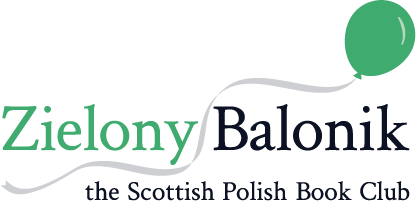Killing the 2nd Dog / The 8th Day of the Week (1992)
Marek Hłasko has been described as Poland’s angry young man of the 1950s. The Eighth Day of the Week is a story of two young people searching for a place to consummate their love, while Killing the Second Dog is an absurdist black comedy about the misadventures of two Polish would-be actors turned conmen in Israel.
NB The 1992 Minerva edition pictured includes two works of fiction by Hłasko, which are also available in separate editions.
This brief biography of Hłasko is taken from the Minerva book.

& this is a still striking a film poster from the late 50s for the film version of The 8th Day of the Week.

Marek Hłasko on wikipedia (English)
Buy online:
Zielony Balonik book club notes:
The 8th Day of the Week
It recalls the Beat Poets, the disillusion and waiting Waiting for Godot, the realism of the setting the Kitchen Sink dramas of 50s Britain, but with elements of absurd comedy, such as Agnieszka’s father walking on his hands.
An in-the-moment style; a rebel with a cause (wanting to have sex in private) from a lost generation, born in the 1930s, who experienced war, Stalinism, poverty, austerity, abrupt changes after Stalin’s death. A traumatic past, and an unsatisfactory present – little privacy or pleasure for anyone. Crampled living conditions – five adults share a one-bedroom flat. Where people enjoy themselves are in the cramped bars and clubs, so hot everyone is drenched in sweat.
The book had a major impact when it appeared. The film is less bleak but there were scenes that captured Warsaw at the time. Praga was always something of a demi-monde area, and remained so under Communism. Hłasko disliked the film, which brought him attention – too much, he felt.
Most Polish women at the time worked or studied, but the way they are treated in the book is shocking. Who can they trust? A dog-eat-dog world. Elements of male violence, though any machismo is undercut by the men’s incompetence and sense of failure – Agnieszka’s dissatisfied father, her brother losing himself in alcohol, Zawadski the jealous lodger who threatens to inflict dreadful violence on his fiancée but can’t reach her to do so because the car he has been repairing keeps breaking down.
Writing from the female p.o.v. isn’t entirely convincing; Hłasko does better when writing autobiographically, as in Dog.
A cyclical element – what do Agnieszka & Piotr have to look forward to other than a marriage like her parents – illness, stress, unhappiness.
To what extent is she in love with Piotr? Something else is going on between them, within her. A loss of innocence. She can’t find her place in society (literally). Wanting to make her own decisions, but feels thwarted. Reich – social problems of sexuality. That Agnieszka is a virgin throughout is made explicit only at the end, though perhaps it’s implied by her unwillingness to have sex just anywhere.
The characters have agency, but the choices they have are limited.
Killing the 2nd Dog
The actor tries to take over from the director. Broader themes, the play within a play, the script Jakob sticks to, leaves, forgets at times. (Robert is against declamation.)
Based more on Hłasko’s own experience (the setting at any rate, but the plot itself?!)
Perhaps a greater degree of misogyny than in the 8th Day, given the American woman’s apparent gullibility – but she does understand what is going on – when Jakub confesses he is a gigolo, she says “I know” – and only does what she wants to. She doesn’t give them a huge amount of money and, compared with what we hear about the pair’s previous victim, remains unscarred by the experience. Nonetheless Agnieszka is a more rounded character than her – or at least more developed.
John is a strange character, a fatherless boy whose father when he turns up is a sad alcoholic… maybe his mother knows what to expect, and is ‘buying’ Jakub for him as a kind of alternative role model.
A sleazy life in the Jewish homeland. Robert is Jewish, Jakub is not (just as Hłasko, who lived there a time, was not).
They are all people damaged by the war. Jakub itemises his traumas, has seen much ugliness.
They watch Casablanca repeatedly. Why? Perhaps for the purity of it emotions, the clarity of the choices the characters have to make, so far from their own messed up, damaged psyches.
Why do they spend so much money feeding the dog? Perhaps to give themselves the air of rich people – but they don’t do this in a performative way, showing off what the dog eats. Maybe it’s simply so that it looks like – because it is – an unusually well-fed dog (one can imagine the town’s otherwise scrawny dogs, though no explicit comparisons are made).
The 90s film cut the absurd and black comedy of the book – the corpse in the taxi, the hunchback outside the toilets, the rabbis coming to blows over who gets to touch his hump first…
In Poland Hłasko gave up studies to work as a truck driver. An observer – better writing thus than as a novelist? He spent time in the US with Polanski, the composer Komeda and other Poles working in Hollywood, but his English wasn’t good enough to survive, and he couldn’t write film scripts.
2024 is the year of Hłasko. His letters are due to be published, and an interview with his mother.


